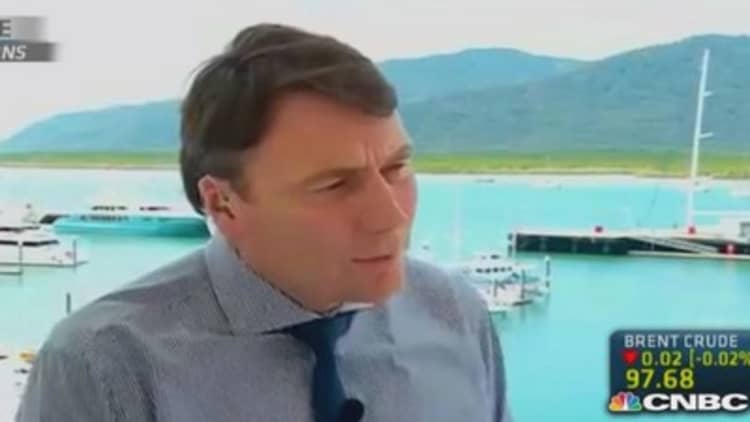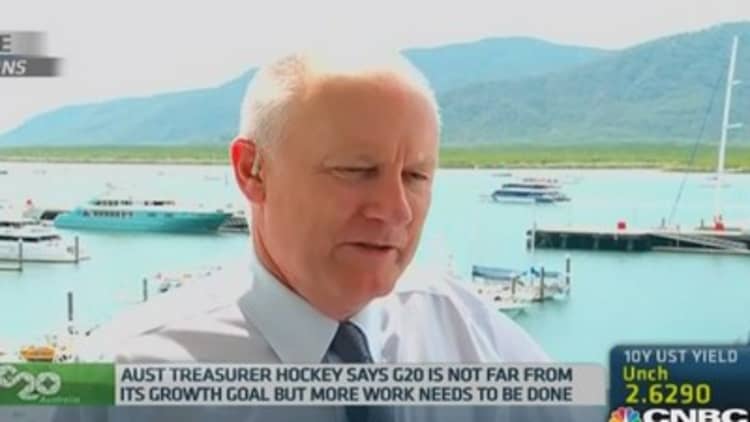The outlook for the global economy leaves much to be desired as a tepid recovery in Japan, slowing activity in emerging markets and weak demand in Europe puts these economies on an uneven keel with the U.S., sources at the Group of 20 (G-20) meeting in Australia told CNBC on Saturday.
On Monday, the Organization for Economic Cooperation and Development (OECD) raised similar concerns, cutting its growth outlook for major developed economies.
The OECD reduced its 2014 and 2015 growth forecasts for the U.S. economy to 2.1 percent and 3.1 percent, respectively, from forecasts of 2.6 percent and 3.5 percent made in May. It cut euro zone growth forecasts for the same periods to 0.8 percent and 1.1 percent from 1.2 percent and 1.7 percent, respectively.
Read More OECD cuts US growth forecast, warns on risk assets
However, U.S. officials at the G-20 meeting said they are confident about the underlying dynamic in the U.S. economy, highlighting firm housing, steady consumption and solid job creation, as reflected by recent economic data. They expect the U.S. economy to expand 3 percent in 2014 and 2015.
Dim outlook in Europe
While participants agreed that Europe was underperforming, sources said there was a big divide on how to kick start the economy.
Euro zone inflation rose 0.3 percent on year in August, in line with expectations but marking the lowest reading in five years, data in early September showed. Meanwhile economic growth was flat in the second quarter, below expectations for a 0.1 percent on-quarter rise. Unemployment, another sore point, remained stubbornly high at 11.5 percent in July.

The underwhelming readings added to a string of poor data points, which led the European Central Bank to cut interest rates to record lows and announce a bond-buying program in September to support the economy.
Read MoreAsian powers agree to ensure geopolitics don't threaten recovery
U.S. officials noted European countries have an array of tools that they can use to promote demand and will need to implement robust reforms to boost growth over the medium term.
Other participants from Europe and elsewhere called for structural reforms as well as fiscal and monetary policies to prop up demand. Some hope that countries with current account surpluses will take additional policy action to support growth.
Japan's tepid recovery
Participants expressed concern about the Japanese economy after it contracted an annualized 7.1 percent in the second quarter as the impact of the consumption tax hike to 8 percent from 5 percent in April weighed on consumption.
Most agreed that a decision by the Bank of Japan to pursue additional easing likely hinges on third quarter growth figures.
Some said that all three arrows of Abenomics, the three-pronged strategy launched by Prime Minister Shinzo Abe last year to jump start Japan's long-moribund economy, need to fly together to effectively promote domestic demand.
G-20 growth target
Member countries have been studying what they can do to achieve the G-20 target set in February of increasing global growth by at least 2 percentage points over the next five years, sources said.

Some countries have working groups that are looking at what kind of measures can be taken to improve competition, labor, trade, and employment and to overcome cyclical slack.
Read MoreUS expands Russia sanctions to Sberbank, energy firms
While there's work to be done to improve the growth outlook in Europe and Japan, G-20 members noted extremely good progress has been made on achieving the growth target and expect progress could boost growth in coming years, sources said.
All member countries remain committed to the growth agenda and will sustain their efforts.
Relations with Russia
There were a number of conversations among the G-7 countries about the continued need to isolate Russia and stand united as an international community, with focus on how these countries can continue to implement sanctions in a way that impacts the Russian economy while having only a minimal impact other economies, sources said.
Whether or not Russian President Vladimir Putin will be invited to the G-20 summit in Brisbane in November is ultimately Australia's decision.

